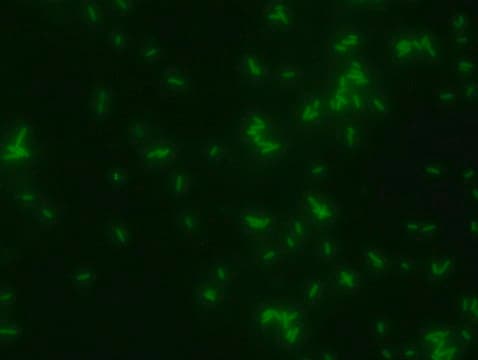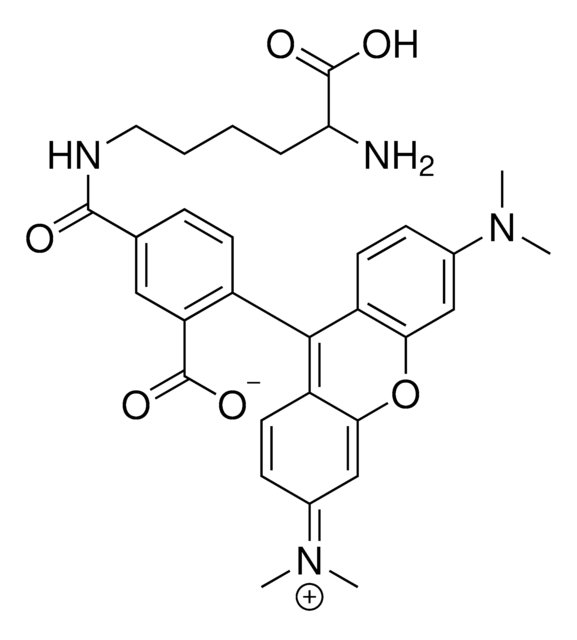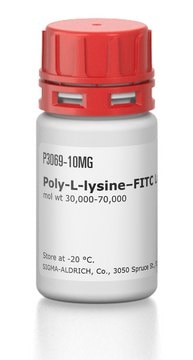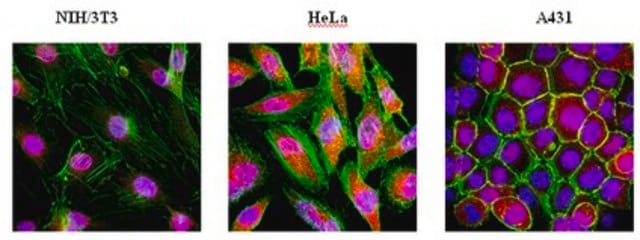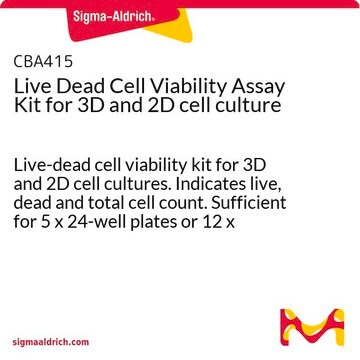SBR00050
FITC Labeled D-Lysine
Suitable for bacterial labeling
Synonym(e):
FADL, FDAA
Anmeldenzur Ansicht organisationsspezifischer und vertraglich vereinbarter Preise
Alle Fotos(2)
About This Item
Empirische Formel (Hill-System):
C27H25N3O7S
Molekulargewicht:
535.57
UNSPSC-Code:
12352209
NACRES:
NA.24
Empfohlene Produkte
Qualitätsniveau
Lagertemp.
−20°C
Allgemeine Beschreibung
Bacterial Peptidoglycan is a polymer consisting of sugars and amino acids, a mesh-like rigid layer that forms the cell wall. D-Amino Acids (D-AAs) are metabolically incorporated onto the bacterial cell wall by D,D-transpeptidase and/or L,D-transpeptidase. It was recently discovered that those transpeptidases catalyze the metabolic incorporation of exogenous D-AAs with almost no restriction of the side-chain identity. Modification of a D-AA with molecular fluorophores provides fluorescent D-amino acids that can efficiently label in situ peptidoglycan in diverse bacterial species.
Fluorescein Labeled D-Lysine is a fluorescent derivative of D-Lysine that is obtained by a synthetic conjugation of D-Lysine to a fluorophore. Fluorescein Labeled D-Lysine has high biocompatibility and suitability for labeling peptidoglycans in live bacteria. Additionally, it can be used in tandem with other stains such as: FITC-labelled Alanine, Rhodamine B labelled Polymyxin B, FITC labelled vancomycin and Dansyl labelled polymyxin B (SBR00049, SBR00036, SBR00028, SBR00029).
Anwendung
Fluorescent labeled D-AAs can be used for many applications including:
- Bacterial cell wall morphology
- Bacterial cell wall formation or remodeling activity
- Bacterial viability/activity
- Identify bacterial activity on surfaces or in substances
- Differentiation betweenvarious bacterial strains according to their incorporation profile of differentD amino acids and sugars
Hinweis zur Analyse
- Fluorescent microscopy application: Fluorescein Labeled D-Lysine has excitation/emission wavelength range at 495 nm/515 nm.
- The recommended working concentration in fluorescent microscopy imaging application is between 250μM-500 μM in DMSO.
- Aliquots of the DMSO solution can be stored at -20°C, protected from light for at least one month.
Lagerklassenschlüssel
11 - Combustible Solids
WGK
WGK 3
Flammpunkt (°F)
Not applicable
Flammpunkt (°C)
Not applicable
Analysenzertifikate (COA)
Suchen Sie nach Analysenzertifikate (COA), indem Sie die Lot-/Chargennummer des Produkts eingeben. Lot- und Chargennummern sind auf dem Produktetikett hinter den Wörtern ‘Lot’ oder ‘Batch’ (Lot oder Charge) zu finden.
Besitzen Sie dieses Produkt bereits?
In der Dokumentenbibliothek finden Sie die Dokumentation zu den Produkten, die Sie kürzlich erworben haben.
Yen-Pang Hsu et al.
Chemical science, 8(9), 6313-6321 (2017-10-11)
Fluorescent d-amino acids (FDAAs) enable efficient in situ labeling of peptidoglycan in diverse bacterial species. Conducted by enzymes involved in peptidoglycan biosynthesis, FDAA labeling allows specific probing of cell wall formation/remodeling activity, bacterial growth and cell morphology. Their broad application
Helene Botella et al.
mBio, 8(5) (2017-09-14)
Peptidoglycan (PG), a polymer cross-linked by d-amino acid-containing peptides, is an essential component of the bacterial cell wall. We found that a fluorescent d-alanine analog (FDAA) incorporates chiefly at one of the two poles in Mycobacterium smegmatis but that polar
Felipe Cava et al.
The EMBO journal, 30(16), 3442-3453 (2011-07-28)
Production of non-canonical D-amino acids (NCDAAs) in stationary phase promotes remodelling of peptidoglycan (PG), the polymer that comprises the bacterial cell wall. Impairment of NCDAAs production leads to excessive accumulation of PG and hypersensitivity to osmotic shock; however, the mechanistic
Erkin Kuru et al.
Angewandte Chemie (International ed. in English), 51(50), 12519-12523 (2012-10-12)
Tracking a bug's life: Peptidoglycan (PG) of diverse bacteria is labeled by exploiting the tolerance of cells for incorporating different non-natural D-amino acids. These nontoxic D-amino acids preferably label the sites of active PG synthesis, thereby enabling fine spatiotemporal tracking
Unser Team von Wissenschaftlern verfügt über Erfahrung in allen Forschungsbereichen einschließlich Life Science, Materialwissenschaften, chemischer Synthese, Chromatographie, Analytik und vielen mehr..
Setzen Sie sich mit dem technischen Dienst in Verbindung.
